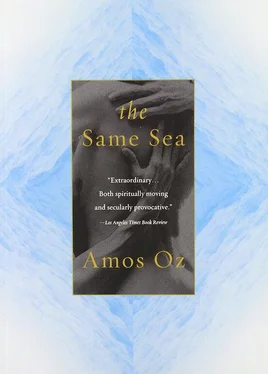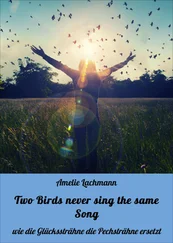what he's up to and stop him and carry him in your arms to your mattress
(submissive, pitiful, experienced, lying on his tummy for you). You cover
him with a sheet of greasy canvas, but he looks up at you with surprise, before
falling asleep all at once. You lay one hand on his forehead and the other
on your own, as though you were your mother. Soft and tired like the child
your head drops on your chest and the darkness draws out of you the hum
of a Bulgarian children's song without words, or with words you've forgotten,
half-remembering you have forgotten, but like the corpse of a drowned man
you can make out the shape of what you've forgotten. Toward dawn
you open your eyes, you're alone on the mattress, the child
has vanished without a trace, in the window silhouettes of boats
coming up from the seabed of night, all around the derelict plant mangy dogs
are barking, skinny dogs shrieking then sinking to a whimper, as a murky sun
chokes through the screen of haze: an opaque sunrise that resembles
a diseased, inflamed eye. Take a few fish and go to your bed. It's so hot.
It will come like a cat before evening. Soft and quick it will come.
Drowsy-cruel, sharp and light, it will come, silently,
on hovering paws, bow-taut back, furry, silky, evil,
crouching to spring it will come like a knife. Honing it will come. Its pupils
tiger-yellow, it is stealthy, arched, fawning, it will come like a cat
on a wall, lying in wait, patiently, coiled like a spring. It has seen a moth.
It wont give up.
It will come; it wont give up. Until it comes come back to me, don't
disappear, at least in the nights come back to me desire of women:
when I was a skinny pimply youth, day and night dreaming poems
dreaming women day and night you didn't leave me: with me
when I lay down, with me when I rose up, burning coals of my night
and shame of my day in my bed, at my school, in the street, in the fields,
scorched by desire for a woman but without a woman: a unicorn
in the morning in the daytime in the evening in my dreams, a brassière
hanging on a washing line, a pair of girls' sandals in the hall, a pencil
turning in the sharpener, a plump thick-braided girl soldier putting
a spoon full of sticky plum jam to her mouth, my blood thickened
to warm honey. Or in the evening, behind a curtain, the silhouette
of a woman combing another woman's hair, any rounded movement,
stirring, kneading, any sound descending to a whisper, a girl sewing
a button on her dress, the feel of face cream or soap, a rude joke,
a dirty word, a whiff of perfume mingled with a secret hint
of woman's sweat, fountained up scalding geyser,
surrounded with a vapour of shame. Even the word "woman" printed
or the curves of "breast" in cursive writing, or the sight of some
furniture on its back with its legs in the air made the stew
of my lust boil over and my body clench like a fist. Now an old male,
a unicorn of memories on his bed pleads with you to come back
to come back, desire of women, to come back to him at night,
give him back at least in a dream that trembling give back the scorch
of glowing coals, lest he forget you, lest he forget come what may come,
on hovering silken paws, soft, furry, yellow-eyed, comes sharp,
light and silent with sharp panthers fangs and a woman's curves.
Every weekend they bring the grandchildren to see me: the girl is a lamb
and the boy is a bear, she calls me Ranny Tee and he
pulls my hair. On Friday night they stay with me
and snuggle in my bed. I protect them
from the nightmares and the cold, and they protect me
from loneliness and death.
The apple never falls far from the tree. The tree stands
at the apples bedside. The tree turns yellow and the apple turns brown
the tree sheds damp leaves. The leaves shroud
the apple. The cold wind leafs through them.
Winter comes autumn is over the tree is eaten the apple
rots. Very soon it will come. It will come it will hurt.
A postcard from Sri Lanka
Dear Dad and Dita, on the other side you can see three trees and a stone.
The stone is the grave of a girl called Irene, the daughter of Major Geoffrey
and Daphne Homer. Who were these Homers? Why did they come here?
What were they looking for? Nobody in the village can remember. Nobody
can explain either why they made a postcard out of it. Were they living here
or just passing through? I scraped the moss off the stone with my knife
and discovered that she died of malaria, at the age of twenty, in the summer
of 1896: more than a hundred years ago. Did her parents, that evening,
six hours before her death, still lie to her and say that she was getting better,
that in a couple of days she would be frilly recovered? And what did she feel
when, between bouts of hallucination, she had a moment of lucidity, like a
hunted antelope, when she intercepted an exchange of glances and suddenly
realized that this was her death, that they had given up hope for her,
her parents and the doctor, that they were lying to her out of pity
and saying that the fever was abating and that by tomorrow
she would be better? Did she whisper That's enough, stop
pretending? Or did she feel sufficiently sorry for them to pretend right to
the end that she believed the lie that was tacitly contradicted by her mother's
weeping? And as she died convulsed by the light of a hurricane lamp
in the tent at four in the morning, who wiped the last beads of sweat from
her forehead? Who went outside first and who stayed with her a little longer
in the half-darkness of the tent? When morning came did Major Homer
force himself to shave? And did someone hand her mother a handkerchief
soaked in valerian? Because of the heat did they bury her that very morning
or did they wait till evening? And where and how did they travel on
from here? Did they leave at once? Or the next day? And how did the jungle
stand around the grave the first night after they left? A hundred years
have passed, so the pain has been stilled. Who is there to grieve? I wonder
whether somewhere in the world there is still an old comb or nail file
or mother-of-pearl brooch that belonged to that Irene. Perhaps in some
drawer in an unused walnut dressing table, or a mouldy attic somewhere
in Wiltshire? And who will want to keep her things, if any have survived?
And what for? Only I, who have no photograph and no image of her, felt sad
yesterday for that Irene. Just for a moment. Then it passed. I ate a grilled
fish with some rice and fell asleep. Today everything is fine. Don't worry.
Haven't I told you a thousand times Nadia I beg you stop filling his head with such nonsense once and for all, he's still young and easily frightened, don't stuff him full of wolves and witches and snow, ghosts in the cellar and goblins in the forest. There aren't any forests or goblins here. We came to this country to put all that behind us, to live on yoghurt and salad with an omelette, to settle down, to change, to defend ourselves when we have no alternative, to banish the old troubles, to be cured of the ancient horror, to sit under the vine in the garden, to recover gradually from everything that happened before, and to begin to distinguish here at last between what is possible and what is sheer lunacy. Haven't I told you a thousand times that my son has to grow up to be a useful member of society, a decent, sensible man with no nonsense in his head in the clouds but with both feet planted firmly on the ground in this land where there are no cottages in the forest but only warm sand and housing schemes. That is what we have, I told you, and what we haven't got we must simply learn to do without. To draw a line. Now look what's happened because of you. You've filled his head with fairies and fog and you yourself have grown feathers and a beak and flown off into the cold. You've left me all these lace doilies and embroidered place mats, who needs them? We could have had a grandson by now. Or a granddaughter.
Читать дальше












